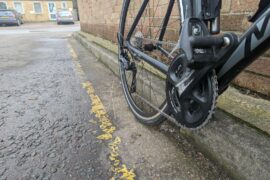Since the coronavirus pandemic hit, cycling has enjoyed something of a boom and has become more popular than ever before. In fact, The Bike Storage Company reports that cycling rose by 46% in 2020 – a greater increase than during the entire 20 years prior.
Whether it was just a lockdown hobby or a newfound passion, taking this activity forward beyond the pandemic years can have countless benefits for both the individual and the wider community.
But is it possible to switch out the four wheels of your car for two? Experts suggest that the most obvious opportunity for bikes to replace cars is for shorter trips measuring five miles or less, which accounted for 58% of all the private car journeys made in 2019.
With this in mind, what are the benefits of choosing to cycle instead of drive? Read on to find out three of the main reasons to make the change.
Cost Benefits
…car owners had an average fuel spend of £1,154 a year…
With the cost of living rising, and fuel prices perpetually increasing, there’s never been a better time to consider using a bike for most of your journeys, especially a commute, in order to save money. Before the pandemic, car owners had an average fuel spend of £1,154 a year, a staggering 3.26% of the average UK salary in 2020. By reducing that cost significantly, or even totally, the savings can quickly add up and leave more breathing room in your budget. Fuel is not the only running cost when it comes to owning a car, of course. Tax, insurance, parking and a whole range of other costs run at a premium nowadays, due to the vast number of cars on the road. Bikes, on the other hand, suffer from none of these problems.

Health Benefits
…lowering your risk of early death by up to 30%
As you are most likely aware, cycling is an excellent form of exercise, and with that comes a wide array of health benefits. According to the NHS, regular exercise is the ‘miracle cure’ that can reduce your risk of developing major illnesses, such as coronary heart disease, cancer, stroke, and type 2 diabetes, as well as lowering your risk of early death by up to 30%. Especially if you are replacing your car with a bike for the purposes of traveling to and from work or school, you have replaced a sedentary activity with an active one. Getting your heart rate up in this way can leave you fitter and healthier, and commuting by cycling can improve your overall well-being.

Environmental Benefits
…of the UK’s total Carbon emissions…91% came from road transport vehicles…
As we all become more aware of our impact on the planet and make efforts to reduce global consumption and emissions, switching your car for a bike can be one of the most impactful changes you can make to your overall carbon footprint. In 2019, transport produced 27% of the UK’s total carbon emissions, and of that, 91% came from road transport vehicles. Because of lockdowns and the shift they’ve made to many people’s working arrangements, it’s difficult to tell if we will reach those levels again in the near future, but either way, the environment benefits from the reduced traffic, and therefore the reduced pollution. Something that some people may not consider is it’s not just the car using fuel that contributes to a large number of emissions. The drilling, refining, and global distribution of the oil used to make the fuel also have a costly impact on the planet.
Summary
In summary, it’s clear that there are a vast array of tangible benefits to using a bike instead of a car, especially in today’s climate.
These include:
- reducing wear and tear on public roads,
- causing less congestion for other cars,
- no difficulty parking, and a reduction in noise pollution.
If you work in a city centre, in some cases cycling can even be quicker than driving, especially if you find yourself spending a lot of time stuck in traffic.
By Ross Hansen
Digital Media Consultant
Hansen Ross Media



Leave a Reply